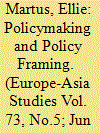| Srl | Item |
| 1 |
ID:
125788


|
|
|
|
|
| Publication |
2013.
|
| Summary/Abstract |
Despite decades of policymaking, the U.S. has only recently made significant strides in becoming a more energy secure nation. With a focus on the executive and legislative branches, this paper investigates two possible political obstacles to achieve this policy goal. The first question it asks is whether or not the two branches have been defining energy security in the same way. As the concept itself has no universal definition, it is possible that the branches have been focusing on different aspects of the term. Results from a content analysis of presidential speeches and congressional hearings suggest that no such division has occurred. The subsequent question asks whether or not the two branches, in tandem, are providing the foundation for sound policy. Results suggest that Congress and presidents have defined and discussed energy security in a generally balanced, comprehensive and internally non-conflictual way. What policy emerges from these discussions should be the subject of future research.
|
|
|
|
|
|
|
|
|
|
|
|
|
|
|
|
| 2 |
ID:
179546


|
|
|
|
|
| Summary/Abstract |
This article examines Russian environmental politics under Putin. It explores the extent to which Putin participates in the environmental policymaking process, concentrating on his role in agenda-setting and policy development. It also investigates the way that environmental issues are framed, and their function within the political system. The findings indicate that Putin plays a key role in shaping the policy agenda but is not involved in the day-to-day policymaking. In contemporary Russia, the environment has become a tool, and on occasions, a weapon, used by Putin to serve a broader agenda. The environment represents a source of regime stability and legitimacy, important for projecting state power to a domestic and international audience, managing demands from the population, and as a way of controlling civil society. Questions remain, however, as to how sustainable this approach to environmental issues is in the longer term.
|
|
|
|
|
|
|
|
|
|
|
|
|
|
|
|